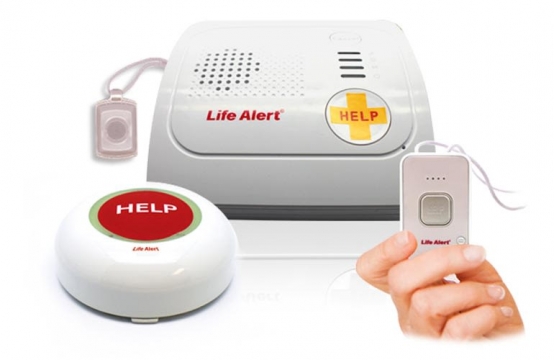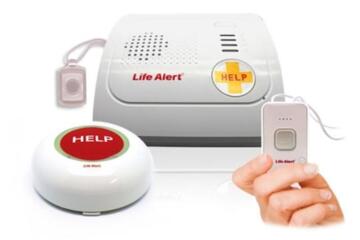Medical alert systems are the perfect devices for ensuring the safety of vulnerable individuals (especially the seniors and the disabled) within and outside where they live or work.
What is a medical alert system?
A medical alert system is a device used to send signals to appropriate personnel or selected individuals when there is an emergency. The device is usually in the form of a pendant and it notifies the appropriate people when the wearer is in distress (especially from a fall).
It is also called a fall monitor, Medical Emergency Response System (MERS) or Personal Emergency Response System (PERS).

Sponsored Listings
How do medical alert systems work?
Medical alert systems come with two components. The button is worn on the body either as a necklace, a bracelet or a wristwatch. The base station is set up somewhere in the home and waits to receive a signal from the pendant button.
The base station, after being signaled, dials either the selected programmed numbers or the emergency operators (depending on the kind of medical alert system). These respondents then call the wearer in distress in order to understand the situation and know the next move. They are able to communicate through the loudspeaker in the base station. The loudspeaker typically has a wide range that allows it to detect a response anywhere within the home.
Types of medical alert systems
Medical alert systems come in different categories.
By button
There are the conventional necklace style buttons, wrist watches or bracelets.
By mobility
The base station may be fixed if the wearer is always indoors (speakerphone medical alert systems) and mobile if the wearer is more active (cellular medical alert systems).
Monitored and non-monitored
The monitored medical alert systems have base stations that call the emergency operators fixed by the company who then determine the severity of the situation to know the next line of action. The non-monitored alert system calls through a series of pre-programmed numbers like family members, friends or neighbors.
There are also the activity tracker type systems, the combination/phone medical alert systems, the location tracking medical alert systems, wellness-check medical alert systems, and many others.
A good medical alert system has a fall detection mechanism. In this case, the distressed needs do not push the pendant button. As soon as a fall is detected, the base station is signalled.
What to expect in a suitable medical alert system?
The essential features of a medical alert system
Battery Life
Ensure that the system has a long and reliable battery life. There is no point if it is always on charge and isn’t worn by the distressed when he or she falls. There should also be a way to know when the battery is low.
Water Resistant
One of the problems of buying a medical alert system is that it is hard to find a water-proof one. However, choose a system that is at least water-resistant since a huge percentage of falls happen in the bathroom.
Return Policies
Choose a company that is confident to let you test out their product. Most companies offer 3-4 weeks return policy to their customers.
Portable Models
Ensure that the wearer at least likes the model of the alert system. Chances are that the wearer wouldn’t want something too conspicuous. He or she must also be comfortable with it on.
How to choose a medical alert system
These are the factors you should consider before you go shopping for a medical alert system:
1. What do you want your system to do?
It’s important to identify the extensive use of the medical alert system before choosing one. Do you want it to call after the button is pushed or automatically? Do you want it to call before the fall or after? Do you want it to be able to locate the wearer? Do you want it to come with motion detectors? Should it have extensive home security monitoring such as detecting smoke or fire?
These factors are dependent on who the wearer is; whether he or she is still relatively independent and mobile or not.
2. Do you want it monitored?
For any small town and close-knit family, it is easier to buy the non-monitored systems. This is because they are available immediately the base station calls. However, in large cities or with busy families, it’s safer to go with a monitored alert system.
This way, if you are in a meeting or out of town, the best care is still given to the distressed.
In addition, it is important to know if the company uses its own emergency operators or if it is using a contracted emergency operating company. The operators need to be efficient and the response should be swift and immediate.
3. Is the cost favorable to you?
When choosing a medical alert system, go with the one that is budget friendly but efficient. With so many companies out there, it will be hard not to find one that will be friendly to your pocket. Make sure you check out the contract and fine print carefully. You do not want to get into a long-term contract with the company.
You usually should not have to enter into a long-term contract. A monthly instalment plan should be sufficient since you never know when you may need to stop using it. Some companies may try to wiggle in penalty fees for cancellation.
4. Consider full home coverage.
The home range is of the utmost importance when using a loudspeaker medical alert system. You have to choose an alert system that covers the whole expanse of your house. This way, the base station loudspeaker will be able to reach the distressed and he or she can be effectively communicated with.
5. Determine the instalment procedure.
Some companies have local staff who fix the base station up for you. But chances are that you won’t need anyone. The medical alert system should be relatively easy to set up with a good manual and adequate explanation.
6. Do not wait for an emergency to buy one.
Waiting for a fall might prove too costly. You need time to be able to read product reviews, to determine the durability and to ask all the important questions.
In summary, the best medical alert systems should take cognizance of the notable observations above. As they say, “it is better to be prepared ahead of an emergency than to be caught off-guard.” Go get your alert system today!
Disclaimer: Our service is not intended to be, nor should it be construed as financial advice. We help our readers make informed decisions via impartial information and guides. Where appropriate, we may introduce partner companies who can provide services relating to financial products.













